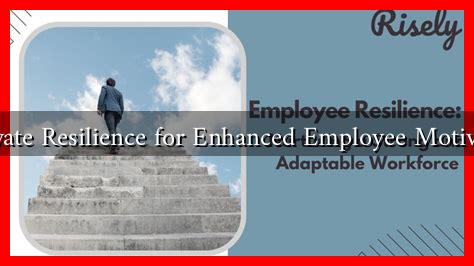-
Table of Contents
- How to Cultivate Resilience for Enhanced Employee Motivation in 2025
- The Importance of Resilience in the Workplace
- Strategies for Cultivating Resilience
- 1. Promote a Growth Mindset
- 2. Foster a Supportive Work Environment
- 3. Encourage Work-Life Balance
- Case Studies: Successful Resilience Initiatives
- 1. Google’s “Project Aristotle”
- 2. Microsoft’s Growth Mindset Initiative
- Conclusion: Building a Resilient Workforce for the Future
How to Cultivate Resilience for Enhanced Employee Motivation in 2025
As we move into 2025, the workplace landscape continues to evolve, influenced by rapid technological advancements, shifting employee expectations, and the ongoing effects of global events. In this dynamic environment, cultivating resilience among employees has become a critical factor for enhancing motivation and overall productivity. This article explores effective strategies for fostering resilience in the workplace, supported by research, case studies, and practical examples.
The Importance of Resilience in the Workplace
Resilience refers to the ability to bounce back from challenges, adapt to change, and maintain a positive outlook despite adversity. In the context of the workplace, resilient employees are more likely to:
- Adapt to new technologies and processes.
- Maintain high levels of engagement and motivation.
- Collaborate effectively with colleagues.
- Demonstrate problem-solving skills in high-pressure situations.
According to a study by the American Psychological Association, resilient employees report higher job satisfaction and lower levels of burnout. This correlation highlights the need for organizations to prioritize resilience-building initiatives as part of their employee development strategies.
Strategies for Cultivating Resilience
To foster resilience in the workplace, organizations can implement several key strategies:
1. Promote a Growth Mindset
A growth mindset, as defined by psychologist Carol Dweck, is the belief that abilities and intelligence can be developed through dedication and hard work. Encouraging employees to adopt this mindset can significantly enhance their resilience. Organizations can:
- Provide training programs focused on skill development.
- Encourage employees to embrace challenges as opportunities for growth.
- Recognize and reward effort, not just outcomes.
2. Foster a Supportive Work Environment
A supportive workplace culture is essential for resilience. Employees should feel safe to express their concerns and seek help when needed. Strategies to create this environment include:
- Implementing mentorship programs that pair less experienced employees with seasoned professionals.
- Encouraging open communication through regular check-ins and feedback sessions.
- Creating employee resource groups that promote inclusivity and support.
3. Encourage Work-Life Balance
Maintaining a healthy work-life balance is crucial for resilience. Organizations can support this by:
- Offering flexible work arrangements, such as remote work options.
- Encouraging employees to take regular breaks and vacations.
- Providing resources for mental health support, such as counseling services.
Case Studies: Successful Resilience Initiatives
Several organizations have successfully implemented resilience-building initiatives that have led to enhanced employee motivation:
1. Google’s “Project Aristotle”
Google conducted a study known as Project Aristotle to understand what makes teams successful. They found that psychological safety—where team members feel safe to take risks and be vulnerable—was a key factor. By fostering an environment of trust and support, Google has seen increased employee motivation and productivity.
2. Microsoft’s Growth Mindset Initiative
Microsoft has embraced a growth mindset culture, encouraging employees to learn from failures and view challenges as opportunities. This shift has led to a more resilient workforce, with employees feeling more empowered to innovate and collaborate.
Conclusion: Building a Resilient Workforce for the Future
As we look ahead to 2025, cultivating resilience in the workplace will be essential for enhancing employee motivation and overall organizational success. By promoting a growth mindset, fostering a supportive work environment, and encouraging work-life balance, organizations can equip their employees with the tools they need to thrive in an ever-changing landscape.
In summary, resilience is not just a personal trait but a collective organizational strength. By investing in resilience-building initiatives, companies can create a motivated, engaged, and high-performing workforce ready to tackle the challenges of the future. For more insights on building resilience in the workplace, consider exploring resources from the [American Psychological Association](https://www.apa.org).


